The Poetry Of Trust: Building Bridges Through Conversations With Libby Wagner
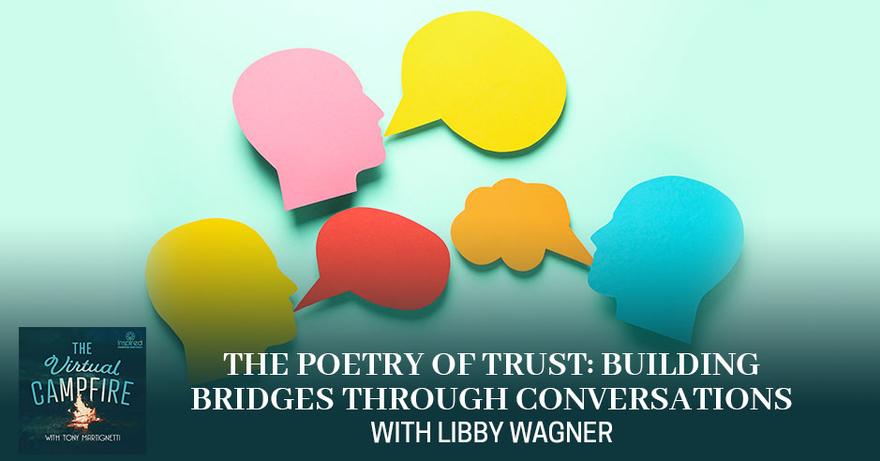
Trust is the foundation of meaningful connections and growth. Libby Wagner, poet, speaker, and trusted advisor, joins Tony Martignetti to explore the power of trust in creating fulfilling work cultures. Libby shares heartfelt wisdom gleaned from her own journey from academia to entrepreneurship, emphasizing the importance of courageous conversations, continuous learning, and self-reflection. She delves into the magic that happens when we dare to trust, revealing how it can lead to deeper connections, unexpected happiness, and a life filled with purpose. Tune in to discover how embracing trust can lead to a more fulfilling and purposeful life.
---
Listen to the podcast here
The Poetry Of Trust: Building Bridges Through Conversations With Libby Wagner
It is my honor to introduce my guest, Libby Wagner. Libby is a poet, speaker, and trusted advisor who works organizations both large and small to create high trust cultures that fulfill their purpose and mission. Libby is the author of the Amazon bestseller, The Influencing Option: The Art of Building a Profit Culture in Business and the author of What Will You Do With Your 90,000 Hours. The boardroom Poet’s Thoughts on Work is the subtitle on that book. Many have been inspired by her TED Talk, Own Your Voice, which is just a wonderful TED Talk. Go check it out. She lives in Seattle with her Labradoodle, Luna and she explores the Northwest in her camper van. I’m so thrilled to welcome you to the show, Libby.
Thank you, Tony. I’m very excited about the virtual camp fires, real campfires and all campfires.
Me, too. I love this idea and it’s why I created the show. I think it’s such a great idea to be able to sit by the fire, share stories and create this element of, what makes people come alive, what makes them their stories so meaningful, and how do we navigate our journeys, which is what we’re going to talk about.
I love people’s stories. You just have the dream job here.
Exploring Journeys Through Life, Books, And Mobility
Thank you. I’m looking forward to learning more about you. You have so many interesting things you do and some great books that you put out in the world, so we’re going to have a lot to cover. We’re going to start with talking about flashpoints. Flashpoints are the points in your journey that have revealed your gifts into the world. What I’d like you to do is share what you’re called to share and along the way, we’ll pause and see what themes are showing up. Does that sound good?
Sounds great.
Take it away, my friend.
I grew up as a kid in the military. My dad was in the military. I was born in Spain and then moved around probably every couple of years for the next twenty or more. In fact, even after I left home, I moved a lot. It’s funny to think about like flashpoints as related to places I lived or flashpoints as related to spaces that I inhabited. When I think about that, I have to think about my nomad-ness, which probably leads to the to the camping van.
I don’t usually name vehicles, but my camera man has her name. Her name is Roxanne. That means what the departure song is. You know what that song is. Unless you’re like a super uber Millennial then you might not know it. I don’t know but her name is Roxanne the Gypsy Caravan. I think many of my flashpoints are about journeys and about mobility. Although, I’ve been living in Seattle for a while now and I feel like this is my home. It’s my home base, let’s say that.
I love that you share this as a starting point because journeys are a wonderful way to think about it. It’s like every time we start a new chapter, were we’re going on a journey and it takes us to a new place. Sometimes, we don’t have to even leave our home to go on a journey. Sometimes, it’s thinking about a new part of our lives and that’s what this concept is about. It’s, how do we think about this next part of our journey without even having to leave the comfort of our homes, if you will.
My favorite way to go on a journey and not leave the comfort of my home is through reading, through books. I’m former English Professor. That’s what I did before I started my business. Half of my professional life doing that and waiting tables because everyone should wait tables and they would be nicer people and then my consulting business. When I go back to books and when I go back to thinking about, what journeys can we go on? I’m always reading about five different books at the same time. Sometimes poetry, always a good novel, business books, spiritual books, self-help books or just books that inspire me. A lot of journeying.
I want to hear how this English teacher made the journey outside of that world. I want to dig deeper into that. Tell me what happened. You got into that world and what made you have the decision that it’s time for something new?
It’s funny that we’re talking about this because I just made a LinkedIn post that I titled Elegant Endings. It was about a non-elegant ending that I executed when I was 24. I have my first job. It was teaching English in a high school in Fort Lauderdale, Florida. I was not very professionally mature and I left there in a terrible blaze of glory and drove across the country to live in Seattle. I did eventually go back to teaching. I went back to teaching at the college and university level.
The turning point was losing my sister to breast cancer and that happened in 2003. She was very young. She was only 36. I didn’t hate my job. I wasn’t unhappy, but I felt like I had reached my creative ceiling in that work. I just quit everything. You can probably relate to the story but anyway, I just let go of it, which is interesting because now I get to work with colleges. I get to go back. I love college campuses. I love the library, the people, the learning and all that but it was a big turning point for me.
You remind me of this idea of letting go of something good is hard but it also is one of those things that is important to do sometimes when you say like, “Something is still missing or something is still yearning in me to reveal. If I don’t do it now then I probably never will. I need to let that new part of me emerge, even though what I have is a wonderful thing.”
That’s a great insight. When I work with people and think about my own journey, I think about how, you heard people talk about like it was a little voice or an intuition or even a slap upside the head. It can come in different ways, the call to make to take a sharp turn or to let go of something. I’m obsessed with thresholds, that liminal space where you like no longer but not yet. I like when other people are in them. I can help but I think that’s part of deeply listening.
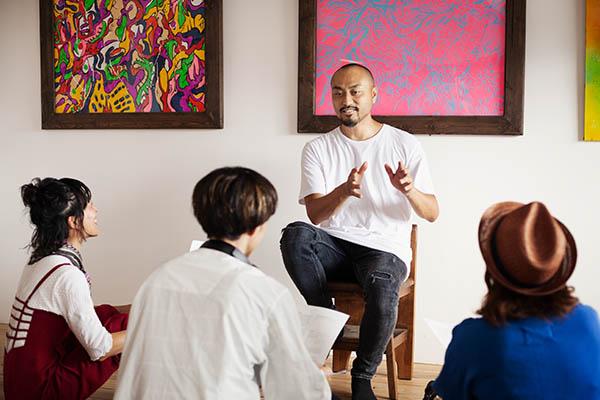
What Led Libby Wagner To Make A Big Leap
You made this decision and it was at a time when you were listening to the things that are going in your world, your sister and the things are happening. Maybe feeling this preciousness of time and you decided to make the leap. Tell me how happened.
I was living in a small town, working at a small college. I loved my job. I had owned my first house, finally. It took me forever. Everyone has their own individual grief journey and there’s no way to predict what that will look like. Lots of well-meaning people were giving me good advice about not making any big decisions and not making any rash judgments. I ended up, I wouldn’t say like I blew up my life, but I certainly turned it inside out.
I gave up what I had studied, what I had done, and my home. Everything. I had a little side trip where I took a job working in state government for a while, but that ended. I went on a trip to Mexico, because that’s what you do when you don’t have a job or a plan. I was with some great friends who were also writers and they asked me a important question. That question was, “If money were no object and you could do anything you wanted. What would you do?” It’s almost a cliché question now but we need to ask it of ourselves all the time. Don’t you think?
I love that question and I also think it’s important to take that trip even when you think everyone’s saying, “No, don’t do it.” That’s insane. You need to because sometimes, getting out of your day-to-day is what we need to disrupt our patterns, so kudos to you.
Thank you. It’s interesting because that loops back to the journey metaphor that I was introducing in the middle of our chat. You’re getting me to think about this, Tony. A lot of transitions or flashpoints in my life have either begun or ended with some physical journey.
That’s great because it’s like you’re not in the world you know but you have this opportunity to say, “Who am I out in the world?”
Going back to that thing you mentioned, about that idea of aliveness and what is it that I am being and doing in my life that creates more aliveness and more engagement in and what’s to come because you’re right. When we lose someone or something shifts or something is definitely not the same, it would be a shame if we didn’t learn from that situation and opportunity and say, “What’s here for me?”
When we lose someone or something shifts, it would be a shame if we didn’t learn from that situation and opportunity.
From Academia To Entrepreneurship: Embracing The Journey Of Possibility
You know I’m going to ask what’s next. What happens along this path? You’re like, “This broken record and this guy keeps asking question.” I want to know how did you create that next path.
I was in academic and I said to my friend who asked me that question, “I’d like to start a business.” “I like to work with teams and help them be kinder and better.” Whatever. I had done a little bit of this work as I had worked in that in that state covermount job. I had a great boss who just pretty much let me do what I want to do as long as it’s fit in the parameters of what we were doing at the time. I was learning on the job.
Every time someone said, “Who wants to take a class in employee law or whatever?” I’d be raising my hand because I was a poet and an academic and I didn’t have the language for organizational development or business or performance management or some of those kinds of things that I do now. When I said this to my friends, they didn’t laugh. They said, “You probably be pretty good at that.”
I came home and announced to people I knew, “I’m going to start a business.” Everyone went, “Okay.” I joke around and say, “When I went to graduate school to get my degree in poetry, we were not hanging out with the MBAs.” The MFAs and the MBAs are at the same cocktail parties. We weren’t chatting. I was like, “I don’t know what those people are talking about over there,” and same. I came back and I said, “There must be a book about how to do this,” because I was an academic. There must be books. I ordered about 3 or 4 books on consulting and I ended up at the time, with Alan Weiss’s book, Getting Started in Consulting. I got more excited as I read it because I was like, “I could do this.” I thought he had a good voice. Most business writing as you know is boring.
Especially back then. I knew you were going to say Alan Weiss because that was the book people picked up.
Many people have benefited and learned from him and created their own paths and brands. I know you and I both love Dorie Clark. That’s where I met Dorie. It was in that community of independent consultants. I showed up there and I called them up and said, “I want to apply for your mentoring program.”
I didn’t know there was not an application process and his from New York, very straightforward said, “What have you been doing?” I said, “I’ve been in education and state government.” He was like, “You’re going to have to change your paradigm about everything.” I remember thinking, “I don’t know if that’s true.” He was so right because I didn’t know how to do anything. I didn’t know how to write a proposal or talk about money or anything. I just thought I could do it.
There’s something about what you’re sharing so far. This part that I want to like reflect back on you, which is interesting. This openness that you showed, it’s like you were in secret mode. You weren’t like, “I’m going to pack. I’m on it. I’m doing my thing and everything’s fine. I know where the next chapter is going to lead.” You were in secret mode, so you’re yes to everything that came down the pipe. In many ways, that was a great thing because it allowed you to see what happens and not be attached to anything. That breaking through allowed you to get into a lot of interesting things and to be bold.
Thank you for that reflection. I’m quite an organized person. My closet is very organized. I’m a Virgo. I like to just claim that. The truth is, even if I think that I would love the path all spelled out, it’s not. The entrepreneurial path isn’t. If I’ve known how tumultuous or unpredictable or any of those things, I might have been more frightened but I had no idea. I was open on. I also thank my parents.
My dad was in the military. My mom stayed at home. They both went to college later in life because my dad was a Vietnam veteran. He went using the GI Bill to college. My mom had not been to college. She went when she was 38, so I had already left home. I didn’t have around me anybody telling me I couldn’t do something but I also didn’t have anyone around me saying, “This is the path.” It’s interesting, isn’t it, how we find our ways?
It’s that right there. It’s such an interesting dynamic because there was no button. It was more of a like, “You can do what you want,” but also there’s no clear path, so it was a bit of both. The future is wide open and no pressure.
One of my favorite Emily Dickinson lines is, “I dwell in possibility,” and I think that’s true for me. My favorite question is, what if and I’m that way in my life, with my clients and my friends. When I was a college professor, that was maddening because what if became me recreating all the classes every year instead of sticking with the same thing. I’m like, “What if we read this book? What if we did this exercise?” Even now when I have developed these amazing licensing programs for my work, I have to like rein myself in all the time for revising everything all the time. The good side is that I’m open, so thank you for that reflection. That’s great.
The downside of being open is that, sometimes you’re too open and then you create this path of having too many things going on.
I’m feeling that way a week before Christmas. I’m feeling like, “What? How did I say yes to all those things?”
Tell me what happened next on your journey or next flashpoint you want to get into. I don’t mean to like lead the witness but can you tell me where you to go next?
I started my business and the good news was, I didn’t have a lot of bad habits to unlearn in terms of like how, interacting with clients or managing my time or any of those things. I was learning literally from scratch and it took a lot of courage. I would never have described myself as an entrepreneur ever. Never. I didn’t even know what that meant probably. I thought I wasn’t good at working for anyone else. I had been lucky in my roles that I have had some cool bosses.
As a college professor, I had a lot of autonomy. I still have to show up and do things and be committed and all that but inside my classroom, the experience I was creating were very creative and autonomous. That helped me be there. The next flashpoint for me was, right before I started my business, I had met someone who had done some research with some psychologists around trust and what were the behaviors that engendered trust.
Bob Wyant, who had worked many years in high tech industries helping people. In his consulting business, I had met him and he was going to retire. I bought his intellectual property from him and I was able to take the work that they’d done and my knowledge of adult learning and curriculum design. I created these amazing programs I’m super proud of. They are about influencing with integrity and confronting with without conflict and having courageous conversations.
That’s what I do. I help people talk about things that matter so they can do the work they need and want to do. This is a like a flash forward point, but it was cool. In October, I got to go to Mexico, where my work was rolled out all in Spanish. It’s been translated into Spanish and French. That was a big deal to me because my mission became changing the world one conversation at a time.
Even though I feel like I’d been doing that for a while, Tony. I did feel like when it was translated into different languages and I was in that community with those people and I only have like kindergarten Spanish. I had great people who were bilingual helping me but it was so cool. It was a pinnacle work for professional moment.
I love hearing that. You know that is where your work starts to make a true impact when you see that and your mission. Was it, changing the world one conversation at a time?
Yes.
The Role Of Trust In Influence And Leadership
I love that, but what I truly resonate with is this idea that trust is the foundation of influence and it is. I’m sure that’s where you thought about. It’s this is idea that if you want to influence others they have to trust you first.
In the time that I’ve been working, more and more research has been about trust. People are talking about trust all the time but I remember like and maybe like 2012 or something like that, when the cover of the Harvard Business Review was about trust. I think that had been the first time that the day had talked about it and then Stephen Covey’s grandson had done all that research and Marcus Buckingham.
All those people we’re talking about like, “How is it that people’s behaviors and their trustworthiness impact what happened?” There’s still so much work to do. That’s what I would said. It doesn’t matter that we have like 30 books on it. There’s always work to do. Part of it is because it’s like fitness or taking care of yourself. You don’t just do one thing. It’s a practice and trust is a practice in any relationship that you have.
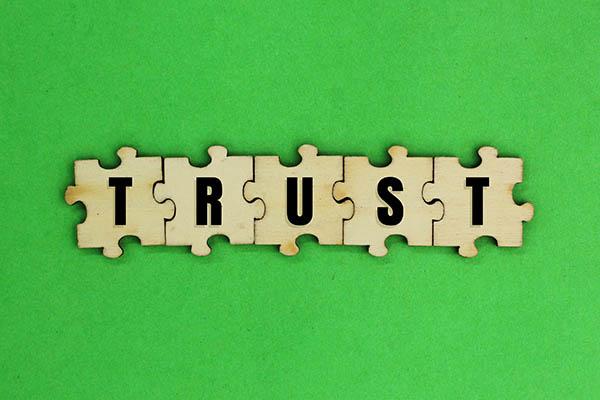
What you said there is so wonderful. Trust is a practice and it’s something we have to get better at. At times, we need to be a little more careful about how we trust and how we understand it. Sometimes, we put trust in people, they let us down and then we get jarned and we don’t want to trust anymore. We have to build like almost an intuition about what happened there and how do I rebuild trust? There’s so many factors to trust about that.
I use a metaphor, if it sounds problematic, you can ask me and I’ll help but it works for most people. That’s that idea of like we have a trust bank account with everyone with whom we are interacting. We are either making deposits or making withdrawals. The research by Robert around interactions was, he was saying, “Every interaction is for better or for worse. There’s no neutral interactions.” If you get on the elevator and I’m in there. I’m going to be like, “How’s your day going?”
I don’t want any negative interactions, so I’ll probably be that person who smiles and says hello. If we think about like am I filling that bank account or am I making lots of a withdrawals and we’re about to overdraw?” Also, the metaphor can work in reverse, too. You can think, “I don’t know how I feel about working with that person or connecting with them. There’s been a lot of withdrawals here.” We can use the idea in reverse too if we want to talk about renewing, sustaining, or building trust with someone. It’s all about the behaviors. It’s our behaviors that influence. Not our intentions.
It's our behaviors that influence, not our intentions.
Exploring The Motivation Behind Writing
I get that. When I think of behavior, it’s how actions speak louder than words and their intentions are great but it’s how the intentions land in the real world. We’ve already started to get into the concepts from your book. It will be great to talk a little bit about why write a book and you can write a book because you’re an English teacher. That’s no big deal. I’m sure there’s some challenges around writing a book.
I do feel a little, the old metaphor about the cobbler’s children, honestly. I’ll do a fireside confession here. I write a lot and I write all the time. I have several collections of poetry. I’m always writing poetry. I write for my business and publish a lot of articles. I have a column and things like that but it’s like way past time for me to write a new book. I get stuck on what it should be about. I probably need to again higher yet another coach for myself on that.
The first book I wrote, The Influencing Option: The Art of Building a Profit Culture in Business and as you know, there’s so many ways to publish books now, wonderful self-publishing routes and working with the traditional publisher routes. There’s pros and cons to all of them. I had a goal of having a commercially published book. It was challenging to publish a book in the leadership space.
I’ll tell you, my favorite rejection letter said, “You’re writing is good but book shelves grown with the weight of leadership books.” The reason I say it’s a great rejection letter is like when you go to poetry school and you learn to submit your work, the way that you know you are a real writer is by the volume of rejection letter you get. Now, everything’s done electronically and so you don’t get the actual letter. When I was first writing, I would like save those rejection letters because it proved I was doing it.
Anyway, I decided that I would write a book that I felt like was a how-to for how to have these conversations that matter and influence in a way that would increase trust and decreased defensiveness. That book is, the Influencing Option is about that. How can I influence and have important conversations and work with teams to create the best high trust culture? It still works. Sometimes, you read something and you’re like, “That’s so cringy. Why did I write that?” I don’t have to I don’t have to confess that to anyone except for you whom I’d confessed now.
Also, the readers.
They all know now. “Which are the cringy parts?”
It’s a classic thing. Anyone who writes something is, you have a little bit of, “I did that?”
Here’s the thing, Tony. Even though in our circles, we know a lot of people who written books but here’s the truth, not everybody does. It’s still a special thing. It’s still a special thing to write a book. We should never underestimate the fact that we committed to something like that, we did it and we expressed ourselves in our voices.
Never make it sound like it’s easy. There might be 1 or 2 people who come on the show and say, “It was somewhat easy to do. I had it in me and it came out.”
I know a few people like that, “That’s annoying. That’s not true.”
You wrote another one. Another book.
What Will You Do With Your 90,000 Hours came from a couple of ideas. I get invited to speak places sometimes. Sometimes, I get invited to speak at graduations. I love speaking at graduations, whether it’s in academy or a school. I have to tell you a segue and you’re going to be like, “What? How come they invited her?” When I was in graduate school, I was translating Spanish poems as part of my journey.
In my Spanish class one day, our professor came and said, “The local prison would like some volunteers to help translate for Spanish speakers. Anybody want to do this?” I was like, “I will.” I don’t even think I knew what I was volunteering for but I was like, “I get my practice my Spanish with people who speak Spanish.” That led to me starting and it’s still going the poets in the prison program at that particular institution. I learned a lot about myself as a poet and writer and so on. That was on my resume. People would be like, “You’ve been in prison?”
Anyway, I was invited to speak at a graduation for a group of people who had just graduated from an academy to become correctional workers. They were going to work in prisons and I was invited to speak at this. Graduations are inspiring and their farming and all that but honestly, it’s not a job that very many people can do. I didn’t want to go up there and not be inspiring and say like, “I’m glad that you are not me.” That wouldn’t have been very inspiring.
The thing about that particular job is, if you do a good job, no one hears about you. It’s very quiet. I kept thinking like, what am I going to say that would be inspiring? I did a little poets math and I added up, if somebody starts working at this age and at this time. In the US, we’re not that great with vacation, so that’s going to be like 50 weeks a year, X number of hours per week, etc. I added it up and maybe you retired this age and it came up with this figure of 90,000 hours. I was like, “90,000 hours is a lot of hours.”
I started thinking about how if its 90,000, that’s not 90,000 with people you love. It’s not 90,000 pursuing some artistic endeavor or hobby or sport. It’s with people you don’t pick sometimes doing things that aren’t that awesome. I thought to myself, “If its 90,000 hours, then it should be good.” Part of what I ended up talking about that day and it’s part of my talk was you’re going to have 90,000 hours. You decide every day how you’re going to spend it. That became the way that I began talking about our relationship to our work and having what I like to call a right relationship to lively hood.
The truth is many people won’t leave their corporate jobs and it’s okay. You did. I left but not everybody’s going to do that and that’s okay. For when I think is, it’s still matters how we spend that time and we get to make choices in it. That book is a collection of short pieces that are meant to be shared in the workplace. Everybody’s favorite chapter is chapter 5 and the title of this is, Dude, it’s you, because that’s based on leaders going, “Can’t you fix these people? Can’t you get these people to do it?” No, we need to start with you. Anyway, just a collection of short pieces about how to create more wholeheartedness and engagement in your work.
Sharing A Favorite Poem: A Glimpse Into Personal Poetry
That is amazing. I’m going to go grab that copy of that now. Libby, this has been so wonderful. I have three more questions and I’m going to try and squeeze them in. Number one, I’m going to have to ask you to share what’s one of your favorite poems that you’ve written that you are willing to share. I know it’s asking a lot but I’m hoping you’d be willing to offer up a little taste of your poetry.
I always like to think about that threshold space that we were talking about. I’d like to share my poem, Diving In, which is about that invitation that we get to be more courageous in our lives. “Diving in, sometimes you want to wade slowly in. First, tender feet on a rough beach, sharp stones, and pebbles making your hesitant way to ankles, knees, your hips, your breathing faster getting used to it a little at a time. That’s one way but this is a dark sleepless night with dreams you had long forgotten.”
“Your unknown future is out there. The surface of the lake glitters under moonlight, it is cool and silky but the deep dark waters hold secrets unknown. Dangerous boulders or felled logs, you cannot predict this or the terrible chance that you might instead skim the surface of your life or worse, dangle your feet from the safe seat of the dock. If you can imagine that first sensation, that realization that you have let go of the solid ground beneath your feet. The ground you grew to trust and take for grounded, then this beautiful boy and body of yours Baptized by longing and desire can rise up trailing luminous and moonlight from your fingertips breathless, unbold.”
The campfire has a new poet laureate.
Thank you, Tony.
That was beautiful.
Thank you. My pleasure.
What Libby Has Learned About Herself
I don’t know where to follow up from that but only other questions are irrelevant. One question I’d love to ask apropos to nothing else but what is something you’ve learned about yourself that you haven’t shared already?
This has happened, which is interesting. I think that happiness has come to me in ways I wouldn’t have imagined. What I mean by that is I hadn’t crossed off all the things on the list. I haven’t done all the things. For many years as a young person, it was like, “I will be happy if,” and then there’s the list that happens after that.
Even though if you would have told me that, I would have said to you, “Tony, let’s think about all the all the ways that your life is rich, deep, and full now.” I don’t think I got that emotionally and that feels like a good place to be, which doesn’t mean I don’t have cranky bad days but to realize that that’s the gift of being on the journey, is realizing that the happiness, contentment, peace, and serenity, any of those things that we are looking for might not look like we thought it was going to look.
Happiness, contentment, peace, serenity—these things may not come the way you expect, but when you realize that they’re part of the journey, that’s when you truly find them.
You made me think of this idea about nature’s work gets done but it does it in its own time and it doesn’t rush. These momenta of like being at peace with whatever happens next but also knowing that it’s not done. You can continue to move and let things. That’s what true happiness comes from, is this ability to be okay with it.
I love that you brought up the nature of metaphor because it’s my favorite. The seasonality of things and the ways that it takes as long as it takes. I feel like realizing that in a life that is certainly pushed and fragmented and all those kinds of things. We have to be radical and lean into the, it takes it long as it takes and I have to be open to how things are going to unfold.
Books That Have Had A Lasting Impact On Libby
It’s beautiful. We only have one last question and this is that completely different tact here. We’re going to go to, what are 1 or 2 books that had an impact on you and why?
We already talked about this ahead of time. This is so hard and I’m sure everybody says that because they have so many books they love. I’m going to go with my gut feeling about this. I’m going to say that Mary Oliver’s collection of poems which is called American Primitive. Now, she wrote so many books while she was alive.
One of the reasons I love Mary Oliver is that she made poetry accessible to ordinary people, which is always one of the things that is important as an artist and as a poet. I always wanted people to be able to connect with my work and not believe those old misguided English teachers who try to make it seem hard and not for you. I’m just apologizing to everyone for all those English teachers.
She won the Pulitzer Prize for it and it’s just a beautiful book I go back to over and over again. There’s a beautiful book and they’re called Humpbacks and she’s out in the cape near where you live. The Humpbacks are coming up out of the water and she has this line that says, “You hear someone screaming and you realize it’s yourself.” I love that. Anyway, that’s going to be one and it’s impossible for me to choose. Ada Limón is an amazing contemporary poet and I love her work so much.
I read this novel I’m just going to say this and it’s called By Any Other Name and it is by Jody Picoult. She’s my guilty pleasure novelist. She’s a very good writer and she usually chooses some controversy. She researches the heck out of it. I get to learn about things while I’m also reading a great story. This one is about the woman named Amelia Bassano who was a real person who lived during Shakespeare’s time.
There is some evidence that she could have penned some of the Shakespeare plays. This is very controversial. Everybody will get mad and write complaints on your show now. I love Shakespeare but it is fascinating. You get involved in the story and to be historical fiction. Anyway, so that’s good. If you call me every month then I’ll tell you like that month’s two books.
First of all, I want to say that’s one thing I’ve noticed about novelists. It’s not to say to discount nonfiction but when you think about it, fiction writers have to do a lot of deep research and then creating a fiction around it is it’s like the double whammy of the work. A guest I had was talking about The Hunt for Red October and how the author of that which name is saves me. He knew more about like submarines than most people do and would have known. He, in fact, knew so much that the government was asking him questions. He knew the information he did.
I love to read. I love cookbooks. I’m reading a great cookbook by Tim Spector, which is awesome. I’m late to the party but I’m also reading Atomic Habits by James Clear. There’s this wide range of my renaissance interests.
Ada Limón, I should say. I saw her at South by Southwest and she talked about her poem that was sent to the Jupiter’s moon.
You told me about that and I hadn’t seen that interview. It’s so good. I’m glad we came back to Ada Limón. She’s amazing.
She is. I want to get you out on our own time but I want to say thank you so much for such a wonderful conversation packed with so many great insights, stories, and lovely poems.
Thank you, Tony. Thanks for thanks for creating the space for these fireside conversations and chats. It’s important work.
Thank you. It means a lot. It does. This is a work that I love doing but it’s also something that takes time and effort to find anything people like you. Before I let you go, I want to make sure that people know where they can find out more and learn more about you.
LibbyWagner.com is my website and that’s where all the all the things are. It’s going to be fun this coming year. I’m opening up something called the Libby Library and the Bungalow. There’s going to be like cool videos, poems and different things like that, inspiring things for leaders and others. I’m excited about that. That’ll be all there. I very regularly show up on LinkedIn. I would love to have people follow me and share their ideas with me. That’s where you can find me.
Thank you, again. Thanks, readers, for coming in the journey. I know you’re leaving inspired. Please do go pick up from these amazing books and go and follow Libby. You won’t regret it. She’s amazing. That’s a wrap.
Important Links
- Libby Wagner’s Website
- The Influencing Option: The Art of Building a Profit Culture in Business
- What Will You Do With Your 90,000 Hours
- Own Your Voice
- Getting Started in Consulting
- Dorie Clark’s Website
- American Primitive
- By Any Other Name
- The Hunt for Red October
- Tim Spector’s Website
- Atomic Habits
- Libby Wagner on LinkedIn
About Libby Wagner
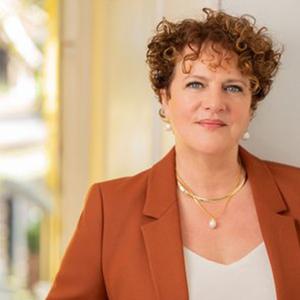 Using her unique approach, Libby helps executives create dramatic, memorable impacts, so they confidently lead their organizations toward innovative horizons.
Using her unique approach, Libby helps executives create dramatic, memorable impacts, so they confidently lead their organizations toward innovative horizons.
She is the president of influencingOptions®, a business consulting and training firm that creates high trust-high performance teams and coaches leaders to hone their skills in courageous conversations to impact the quality of their working relationships. Influencing Options training provides practical, immediately useable skills and dramatic results for performance improvement.
She is a founding faculty member of the Institute of Conversational Leadership and Invitas with poet David Whyte, and works with inspired leaders across the globe to bring the soulful work of Conversational Leadership into practice.
Libby co-founded The Studio, a change consultancy that utilizes the principles of artistry to foster innovation and build highly-engaged organizations with artist-entrepreneurs Steven Morris and Owen Ó Súilleabháin. The antidote to “business as usual,” The Studio is a place of practice where leaders can experiment with and deepen their own unique version of leadership through artistry.
Libby leads inspiring events and retreats for organizations and individuals, either on-site or in Ireland each year.
Love the show? Subscribe, rate, review, and share! https://www.ipurposepartners.com/podcast


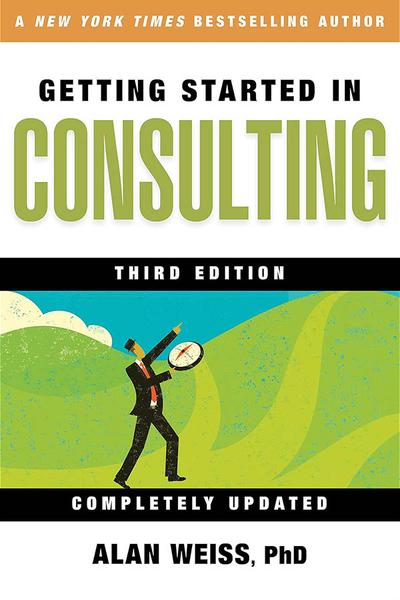
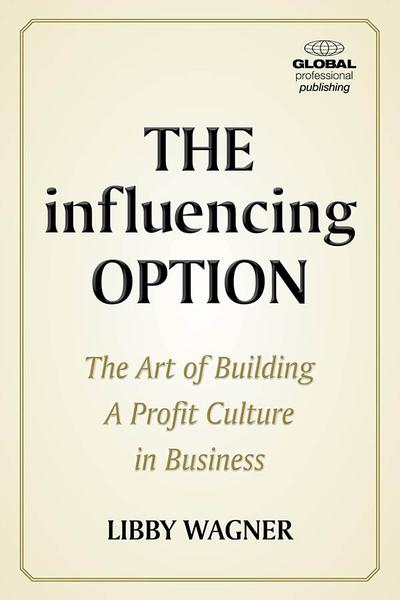
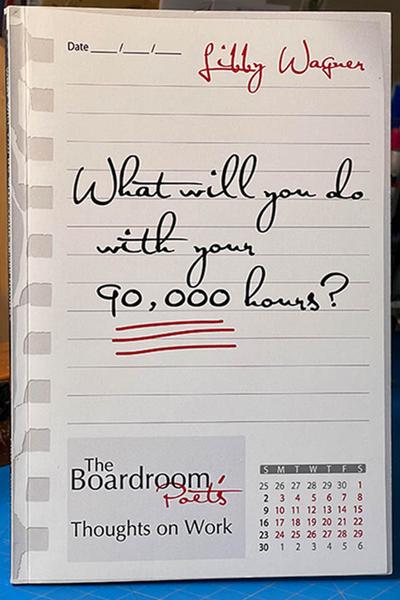
0 comments
Leave a comment
Please log in or register to post a comment